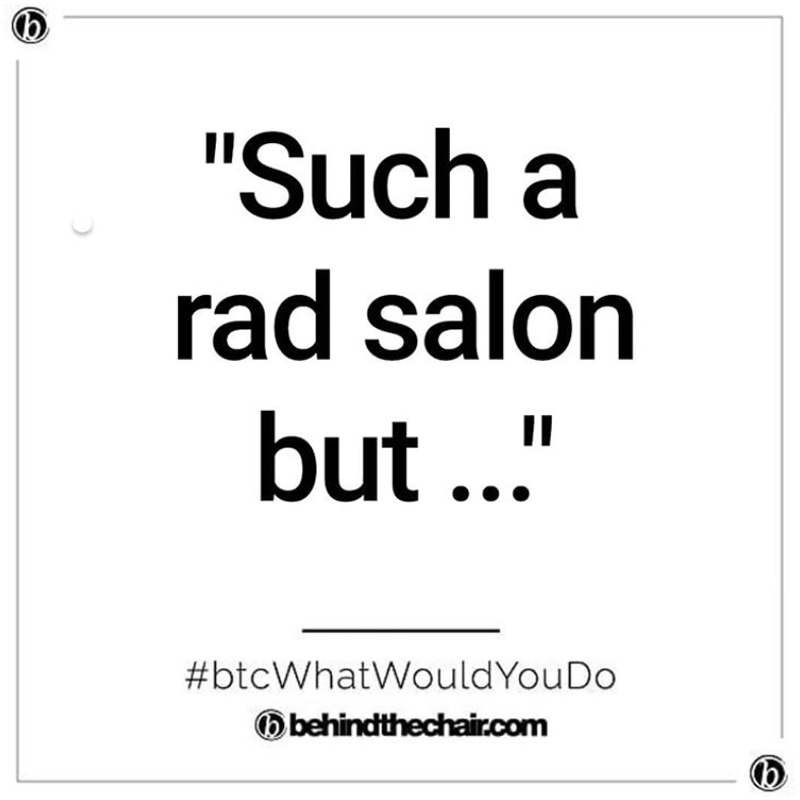Should I Sign A Salon’s Non-Compete Agreement?
WWYD: Salon Non-Compete Agreements
You’ve landed your dream job at a new salon but they ask you to sign a non-compete, should you do it? Let’s start with the basics: A non-compete is a contract that some salon owners use to protect their businesses from losing clients. These often include restrictions on stylists quitting and moving to nearby salons, working multiple jobs at once or taking clients away. But if a stylist is unhappy, should they be able to move on with their career without any penalties? Do these contracts even hold up in court? Keep scrollin’ to find out!
A recent beauty school grad reached out to the BTC fam for advice:
“I’m newly graduated and I’m sure this has been asked before, but I really need some advice! So I’m looking to work in my first salon since graduating and I think, I feel I found it. It’s super cool, very trendy, everyone seems super nice and not only are they close to where I live, they have been open for like six or seven years. My only concern is, they asked me to sign one of those non-compete papers? Now I don’t have any reason to think this makes the salon ‘bad’ but does it? I just know what I’ve read about, and it seems like a lot of times it’s a nightmare?! But I REALLY like this salon! Any advice for a newbie?”
Disclaimer: For more info, look at your state’s laws or consult a lawyer. BTC is not offering any legal advice, but providing the experiences of our community members for a look at every side of the topic.
Need some advice? DM us on Instagram and Facebook!
If You Agree With The Contract, Sign It!

“If it’s reasonable, sign it. It’s to protect the salon’s investment in your continued education and filling your books up with clients that choose the salon you’re working for in the first place. If you leave it’s ultimately the client’s choice, however as a salon owner for over 11 years, there has always been a mutual respect when a stylist leaves. I work thousands of hours for our salon to have a constant flow of clients. It’s really protecting YOU and the salon.” – @birdcagesalon
“Every salon I have worked for has made me sign one. But I totally get it. Just imagine if you owned a salon and didn’t make your commission or hourly stylist sign one. If they quit and open a salon next door and take their clients, you lose money. And now you have competition who knows how you run things and what you charge for prices. But if you did chose to leave and broke your contract, it could really hurt you if you don’t follow it. They aren’t always bad but look at it from the owner’s point of view. Just read your contract thoroughly”. – @alnovak7
“I had to sign a non-compete form and I love the salon I’m at. It hasn’t affected anything, the only thing that makes it hard is when or if you move to a new salon you can’t tell your regular clients to have them follow you to the new salon. If you love the salon then there’s nothing to worry about, you won’t be leaving anytime soon. I signed mine and so did everyone else at my salon and everything’s still great.” – @cassie_lynn28
“There are a lot of key factors to consider when making this decision. It has to be a partnership and mutually beneficial. I am a salon owner and in my salon, I have created a platform that is a guaranteed to make a brand new stylist succeed. We have proven that we can get a new stylist almost completely booked in less than a year. The non-compete is not to screw over a new stylist, but to ensure their dedication and they have 30 days to sign after joining the team. I am not worried about the stylist leaving, but at the same time why dedicate so much money, time and energy to the new talent, if it’s not mutually beneficial?” – @amiemigirova
“I love that salons are doing this. It shows loyalty to the salon and their investment in you as well. If you are the right fit for the salon, this should not matter. And if it is for you then it works.” – @letitiastyles
“It’s to protect the business so you can’t work at two salons at once which would be potentially a big conflict of interest. Any chain salon and perhaps even non-chains will have those upon hiring. It’s pretty standard.” – @dorothystylisthc
“The relationship between stylists is why it is in place [at my salon]. We are departmentalized. So all I offer is color and texture services. One of my co-workers cuts and finishes my color/texture clients. If a haircutter leaves and takes ‘their’ clients with them, it could be devastating to me if I share a clientele with them. The likelihood of them sticking with me for color/texture and said haircutter, traveling to two different locations is probably NOT going to happen. It protects all of us. To be specific, our non-compete is one year, within 13 miles. I personally look at it as my owner’s way of securing OUR business. They also offer us many perks that we are fortunate to have, paid vacations, insurance, three- or four-day work weeks [and] free continuing education including trips abroad. It was worth it to me.” – @stella1973
Protect Your Career—Don’t Sign The Papers!

“I would never sign one. The day will come [when] you want to advance and that one piece of paper will stop you from branching out on your own or to another company in the area. Think of your whole future!” – @jamiekmann
“Salon owner here. I respectfully disagree with non-competes. If it’s the salon you love, it may deserve some consideration, but I generally see non-competes as red flags.” – @kelizabethsalon
“If the owners are making you sign a non-compete, they are not confident that the salon has a chemistry that a new stylist would want to stay. The day WILL come, as we ALL have found, where your skills are refined and you have a solid clientele and will want to do your own thing. This is an issue of controlling loss and revenue for the owners. This is not the direction of our industry anymore. Salons do not OWN their stylists. Clients come to you because they like YOU. Unless you desire to be an employee for literally the rest of your career, consider this carefully. Otherwise, it’s not an IF, but a WHEN, you are ready to be independent, the owner(s) will do everything in their power to send you on your way with no clients, after all your hard work.” – @lucia_zafar
“I wouldn’t sign it, especially [at] your first salon. You don’t know how you will fit. I hate hearing salons or stylists lay claim to a client. It’s so unprofessional to have a client seek a stylist and not be told where they are, or worse to be told sorry I can’t do you now that I moved salons. It should be the clients choice who provides their services. Now their formulas are a different story.” – @twisteddesignsjewelry
“From experience…DO NOT SIGN. I credit my first salon for everything I know, but if you leave, you’re done. It took me two years to get back on my feet after the non-compete absolved.” – @britt.tharp
“Don’t do it! You paid for your schooling. You spent the hours on your education. It’s up to you to further your knowledge on your own. It’s ultimately up to you to make your clients happy, so they return. I would never make my girls sign a non-compete contract. Some personalities don’t mix well. Some stylists need to leave. There is no reason to be worried about them taking their clientele that they have worked hard to please and keep theirs.” – @karriegj
“Don’t do it. No one should have control over your career other than you. I don’t even know how those things still exist honestly, with social media our clients can find us and follow us anywhere.” – @jesswilsonhair
Always Read The Fine Print & Negotiate If Needed

“If you like the salon, I would ask them to consider letting you wait 90 days to sign the non-compete. You get the feel of the salon and see if you want to invest in them and them to you. You have to consider also you are bringing little to the table for them. You are fresh out of school [with] little clientele. So you are a lot of work for them and a liability.” – @meganlovesmiles_
“They have this to protect themselves. Most don’t sue unless you’ve done serious damages to their salon by funneling a huge margin of their business. They aren’t allowed to bar you from working near the salon forever. If it says more than six months or five miles (usually standard), I won’t sign it. It’s worth it if they provide education and a good flow of clients as you’ve just gotten out of school and need to make sure you don’t develop bad habits.” – @a.e.sosa
“Personally, I think a smart business owner implements a non-compete. In certain states, it can protect the owner from a stylist taking personal information of clients and opening a shop right down the street. My advice would to read it thoroughly and if there’s something you don’t agree with, ask them if it is negotiable. For example, if it says opening a salon within a 10 mile radius and you’ve lived in that area your entire life, maybe ask them if they would take that down to five. Also, if you read the agreement and you feel there is something in there that you could see yourself doing in the future, don’t sign it. It’s not the place for you. – @demetramarkum
“It all depends on the length of time the non-compete is for. Read and understand exactly what is in the clause! Don’t be afraid to ask questions or even get legal advice!” – @salonsimplybeautiful
“If the salon is worth it, sign it. My current salon is so open and upfront. We do not have non-competes. I brought my clientele with me and they may also leave with me. It is ultimately up to the clientele to follow or not to follow. In my opinion, a business who is afraid of losing clientele because they lost you as a stylist should be more concerned [about] keeping their stylists happy and more than willing to stay. Read through the paperwork carefully and ASK QUESTIONS if you have them.” – @sarahoffermann
Do Non-Competes Really Hold Up In Court?

“In many states, non-competes are not legally binding whether you sign it or not. In most others, where they are legal, they AREN’T legal in terms of keeping you from practicing your profession. For instance, they can’t tell you not to do hair elsewhere, since that’s your profession. Look into the non-compete laws in your state before making the decision. But keep in mind, even if it isn’t legally binding, if they choose to sue you, it can still tie you up for however long their money goes.” – @brazen_beauty_
“Check your state laws, in right-to-work states non-compete clauses don’t stand. I think for big salons it’s a fear factor for less turnover.” – @giuliana_degiusti
“Depending where you live, it wont hold up in court and depends on the radius they have set. Most times you’re fine and still have lots of options of places you can go to and still have clients follow.” – @brassknucklesxo
“I would explore your state laws first. In some states, I know businesses that have tried to enforce a non-compete clause when there state is actually a right-to-work state, meaning the contract would never hold up. Also, if you get an icky feeling in your gut about something…listen to it.” – @krissykris1218
Click HERE to read the full post. Need some advice? DM us on Instagram and Facebook!









